Overview
Software outsourcing offers significant advantages for SaaS product owners, including:
- Cost efficiency
- Access to specialized skills
- Faster time to market
- Enhanced innovation
By outsourcing, companies can dramatically reduce operational expenses. This strategy allows businesses to tap into a global talent pool, gaining specialized expertise that may not be available in-house. Additionally, outsourcing accelerates product launches through streamlined processes, enabling quicker responses to market demands. Finally, it fosters creativity by integrating diverse perspectives into the development process. Embrace software outsourcing to unlock these benefits and position your SaaS product for success.
Introduction
The landscape of software development is evolving rapidly, presenting a formidable challenge for SaaS product owners. Outsourcing has emerged as a strategic solution, delivering a multitude of benefits that can significantly enhance business operations. By leveraging the advantages of software outsourcing—such as access to specialized skills, cost efficiency, and accelerated time to market—product owners can unlock new avenues for growth and innovation. However, a crucial question persists: how can these benefits be effectively harnessed to streamline development processes and secure a competitive edge in an increasingly crowded marketplace?
SDA: Tailored Software Development Solutions for Business Growth
stands out in delivering tailored specifically designed for software application owners. By emphasizing and seamless technology integration, SDA empowers businesses to enhance their offerings, improve user experiences, and drive growth.
Research shows that companies implementing can achieve that is up to 32 percentage points higher than their peers. Additionally, top-quartile companies, as highlighted by the McKinsey Design Index, enjoy similar revenue growth advantages, reinforcing the critical role of in achieving business success.
SDA's commitment to thoroughly understanding client needs guarantees that the software outsource solutions provided are not only innovative but also with overarching business objectives.
Moreover, as providers increasingly adopt , including user education and training, SDA positions itself as an essential partner in navigating these challenges within the competitive , where effective design and functionality are paramount for success.
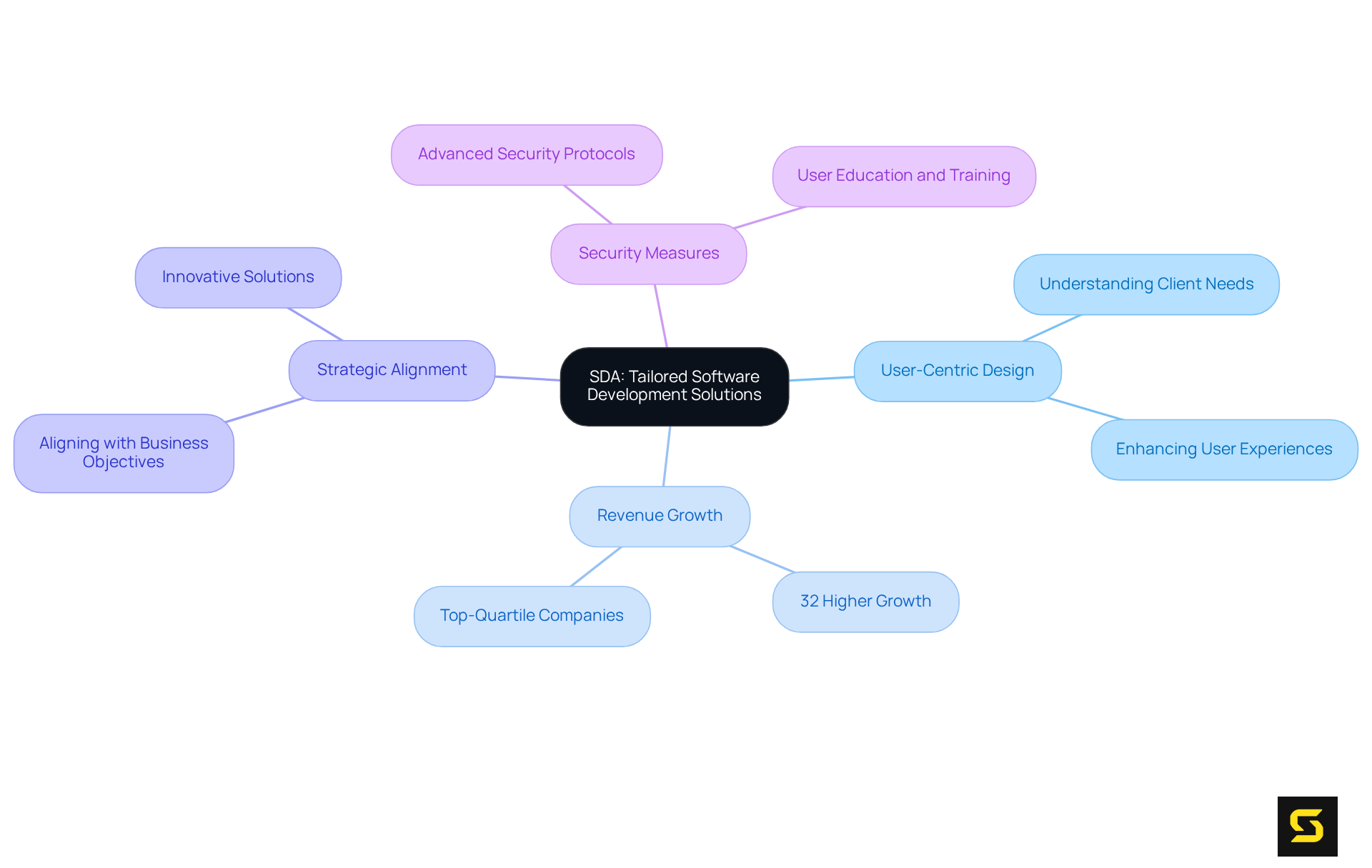
Global Talent Pool: Access Specialized Skills Through Outsourcing
Outsourcing empowers to tap into a , unveiling specialized skills that may be scarce in local markets. This influx of diverse expertise significantly enhances development processes, enabling companies to adopt and industry best practices. According to industry insights, leveraging external resources grants , saves time, reduces production costs, and boosts productivity. Collaborating with skilled professionals worldwide fosters innovation, ensuring businesses remain competitive and responsive to market demands.
For instance, organizations that outsource product management can while their external teams manage development and marketing, ensuring a . As Nicholas Johnson, CEO of Orange Charger LLC, states, "DevsData LLC is truly remarkable - their backend developers are among the finest I’ve ever collaborated with," underscoring the exceptional skill available through external support.
While delegating tasks alleviates resource constraints, it is essential to consider potential risks, such as and communication hurdles. Nevertheless, the benefits of and improved outcomes in software development position as a strategic choice for software application owners.
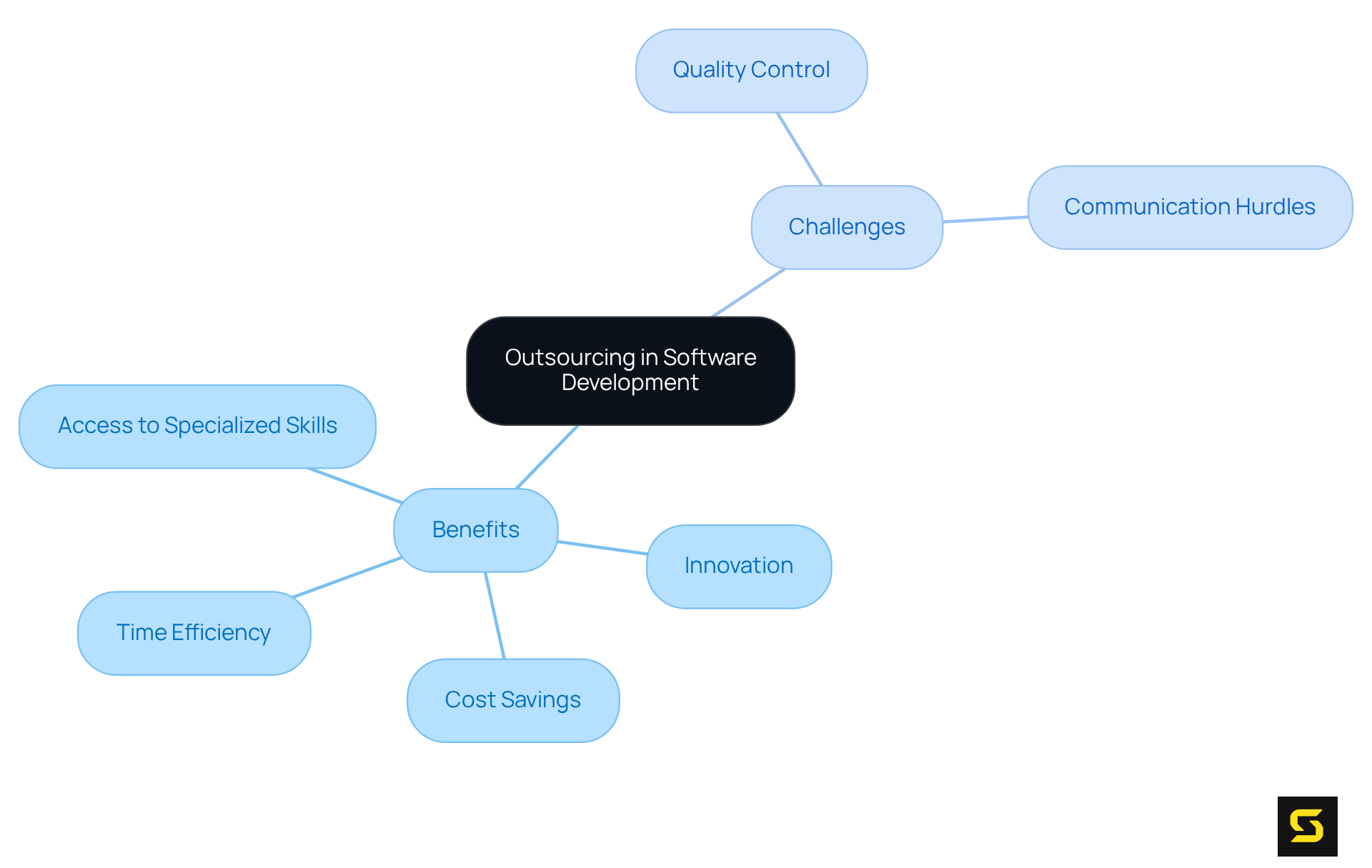
Cost Efficiency: Reduce Operational Expenses with Outsourcing
Outsourcing, particularly , presents significant , establishing itself as a strategic choice for . By utilizing software outsource for development tasks, companies can markedly reduce associated with hiring, training, and maintaining in-house staff. For example, businesses can achieve savings of up to 70% on software costs through software outsource by tapping into , particularly in regions such as Asia and Eastern Europe, where developer salaries are considerably lower. This approach not only but also alleviates the financial burden of infrastructure and training costs, as external partners typically assume these responsibilities.
Moreover, by choosing to software outsource tasks, companies gain the flexibility to , allowing them to pay exclusively for the services they require. This adaptability is vital in a fast-paced market, where rapid growth can stretch internal resources. By adopting software outsource strategies, software-as-a-service firms can improve their , ensuring they remain competitive while optimizing operational expenditures. As industry expert Andrés Perea states, "Outsourcing is not just a tactic to reduce operational costs but a that can lead to , access to a vast pool of global talent, and a higher focus on core business functions.
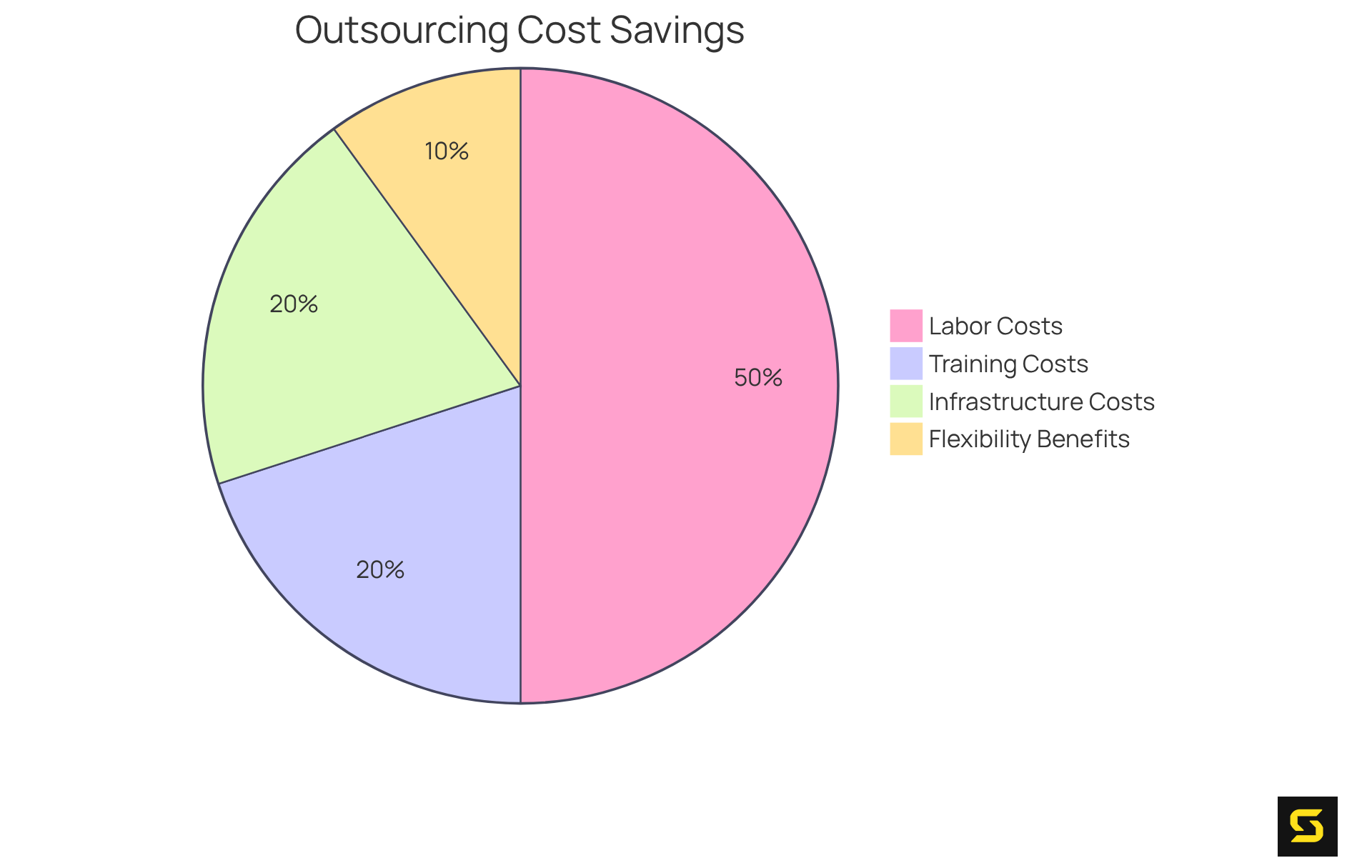
Faster Time to Market: Accelerate Your Product Launches
Outsourcing is pivotal in for SaaS offerings. By engaging , business owners can streamline their processes, effectively minimizing bottlenecks that often hinder progress. This enhanced agility empowers companies to swiftly adapt to market fluctuations and customer feedback, enabling quicker launches that secure a competitive advantage.
Data indicates that organizations leveraging external resources can by as much as 30%, underscoring the tangible benefits of this approach. Furthermore, many software-as-a-service creators have noted that delegating tasks not only hastens their launch schedules but also elevates the overall quality of their products, as specialized teams bring focused expertise and innovative solutions.
Steve Jobs aptly stated, "You’ve got to start with the and work back toward the technology - not the other way around," highlighting the importance of quality in development. Thus, adopting can be aiming to excel in a rapidly evolving digital landscape.
To fully harness the benefits of outsourcing, software owners should prioritize and defining objectives with their dedicated teams.
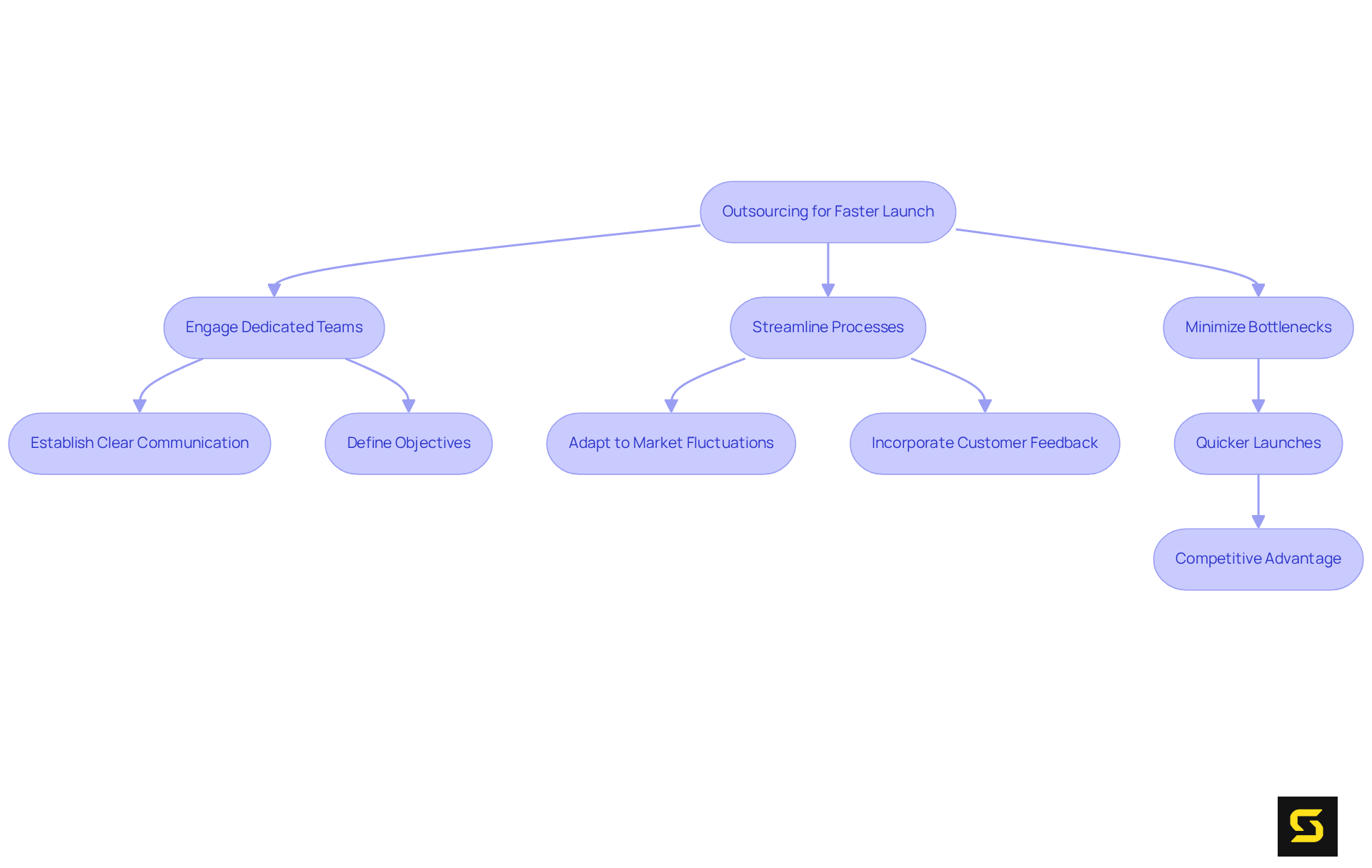
Focus on Core Business: Delegate Development to Experts
through empowers to concentrate on their core business activities by entrusting technical tasks to specialized experts. This not only optimizes resource allocation but also allows companies to such as and market expansion. Consequently, businesses can significantly enhance their overall performance and by development challenges.
Statistics reveal that:
- 65% of organizations outsource to sharpen their focus on primary business functions, underscoring the effectiveness of this approach.
- Delegating tasks can , further supporting the claim of enhanced overall performance.
Successful software outsource entrepreneurs advocate for this model, highlighting that it streamlines operations and fosters innovation and agility in responding to market demands. Firms that have successfully assigned project responsibilities report and a greater capacity to expand their services, showcasing the concrete advantages of external support in the competitive software-as-a-service environment.
However, it is essential to acknowledge that external collaboration relationships can face challenges, with studies indicating that 20% to 25% of these partnerships fail within two years. Therefore, while the benefits are significant, careful partner selection and management are crucial.
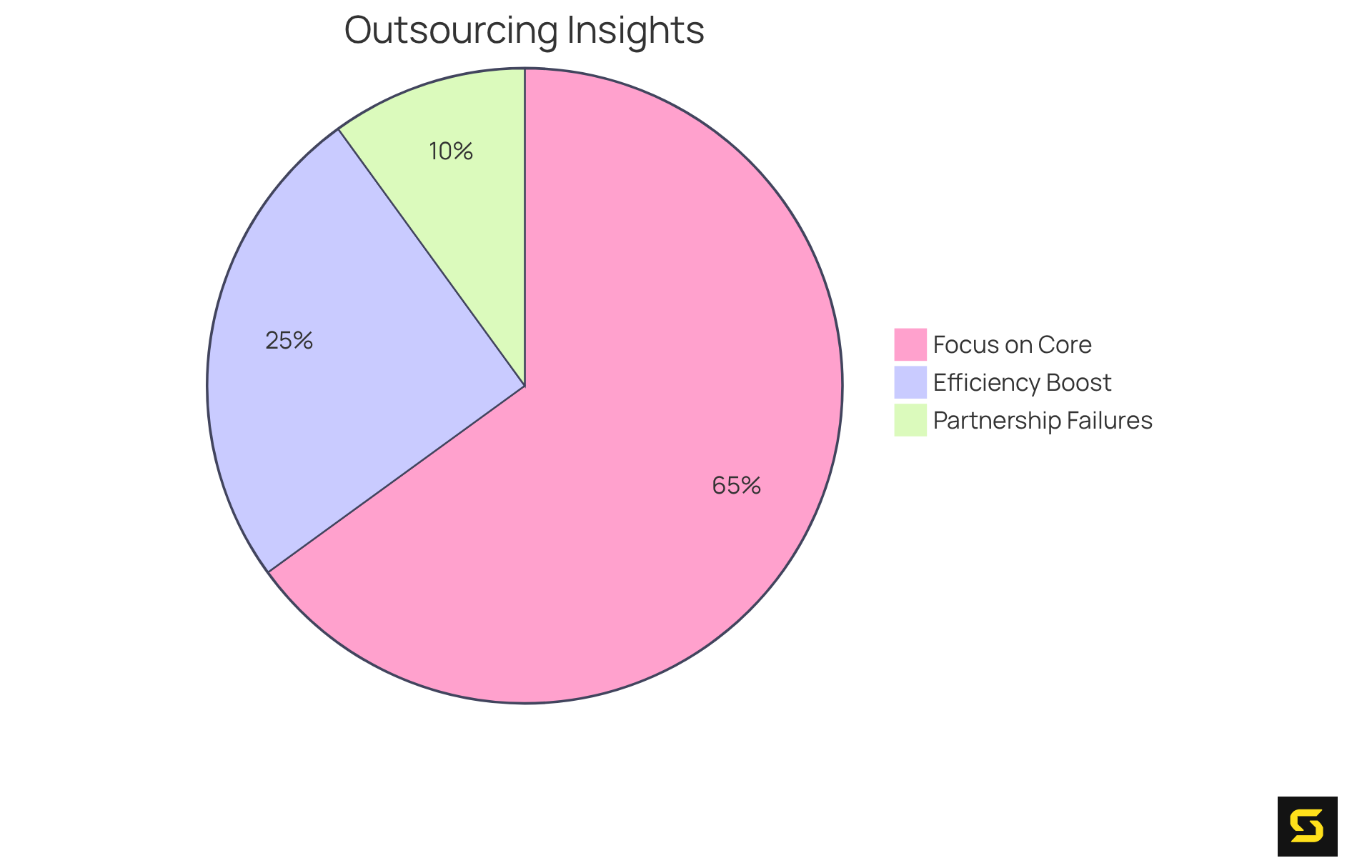
Scalability: Adjust Resources Based on Project Needs
Outsourcing, particularly , serves as a , offering the essential in alignment with project demands.
When a company faces the need for or seeks to downsize during slower periods, without the complications associated with hiring or layoffs.
This scalability empowers businesses to .
By leveraging software outsource, organizations can optimize their , ensuring they effectively meet project requirements while maintaining .
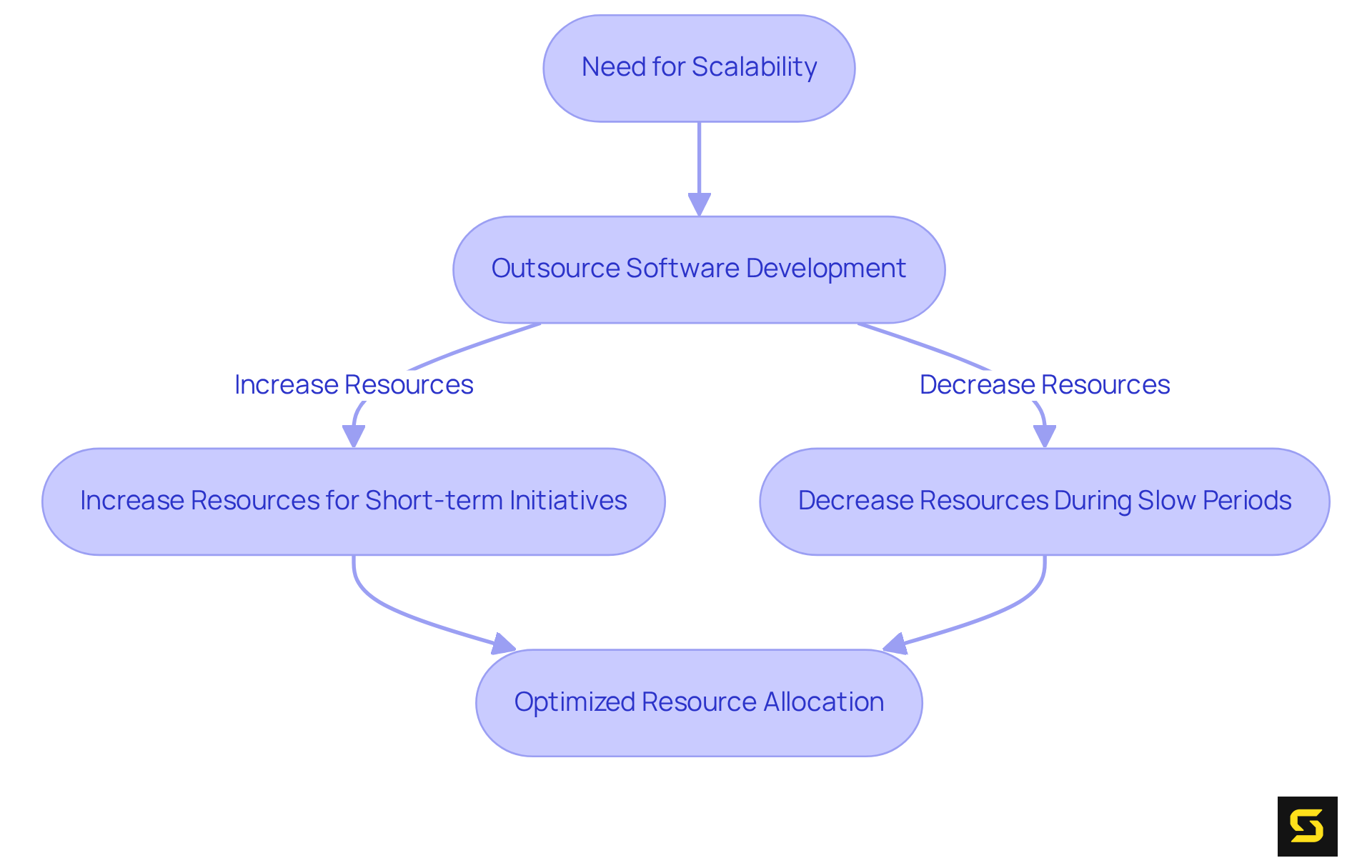
Cutting-Edge Technology: Leverage Advanced Tools Through Outsourcing
Outsourcing, or , empowers SaaS owners to harness and tools that may be . By collaborating with , businesses gain access to the latest methodologies, frameworks, and technologies. This strategic partnership not only but also significantly elevates user satisfaction.
A study revealed that:
- 68% of organizations utilizing advanced tools in their outsourced projects experienced improved project delivery times.
Leading SaaS firms have effectively embraced these advanced tools through external resources, enabling them to innovate rapidly and maintain a . This is essential for addressing the evolving demands of users and ensuring that products are developed with the best available resources.
Furthermore, the is pivotal in validating ideas and ensuring seamless functionality, further underscoring the importance of software outsource in the software development landscape.
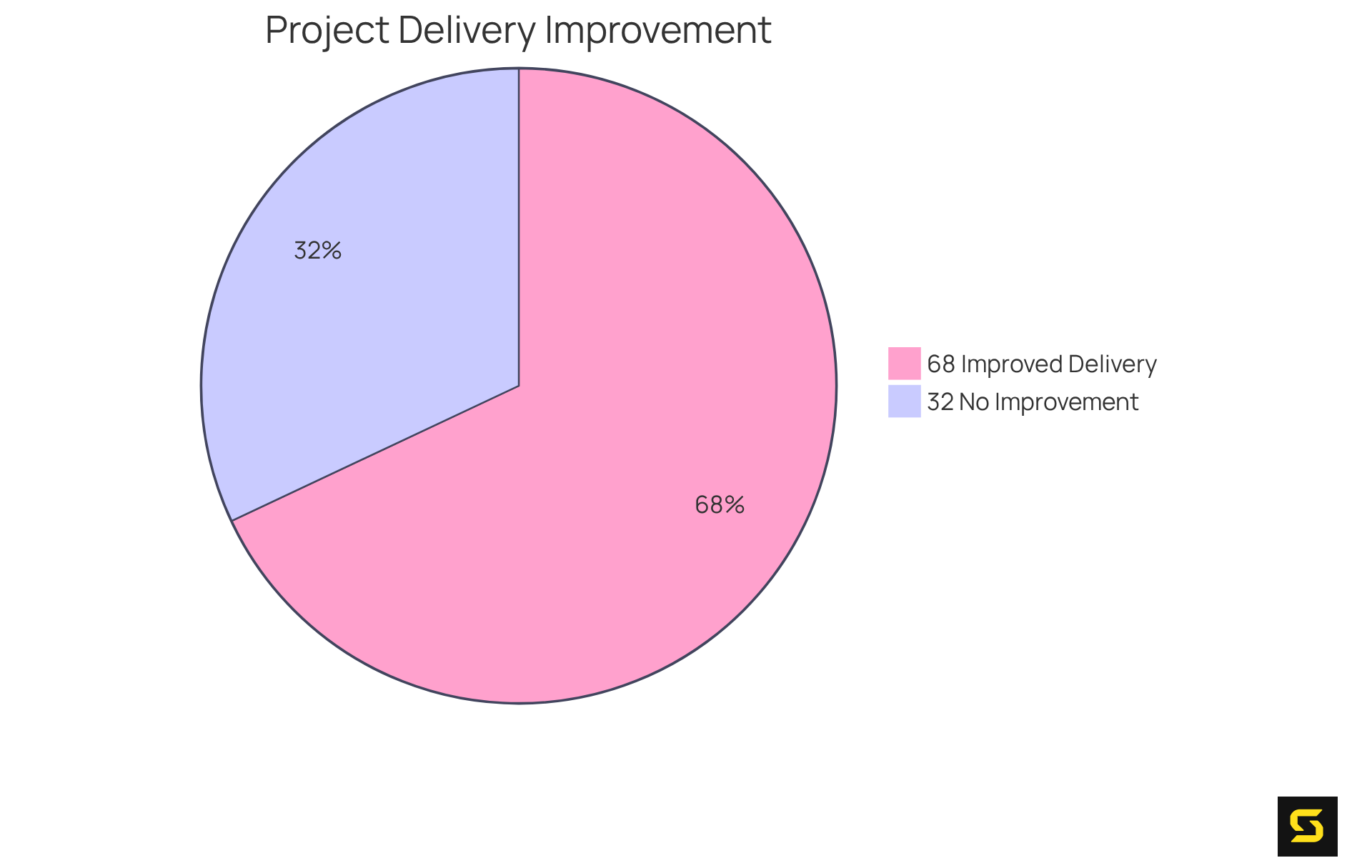
Quality Assurance: Ensure High Standards in Development
Outsourcing significantly enhances the in software creation. Specialized teams possess established and testing protocols that ensure throughout the . By prioritizing quality assurance, software service owners can deliver that not only meet user expectations but also . Embrace to and achieve .
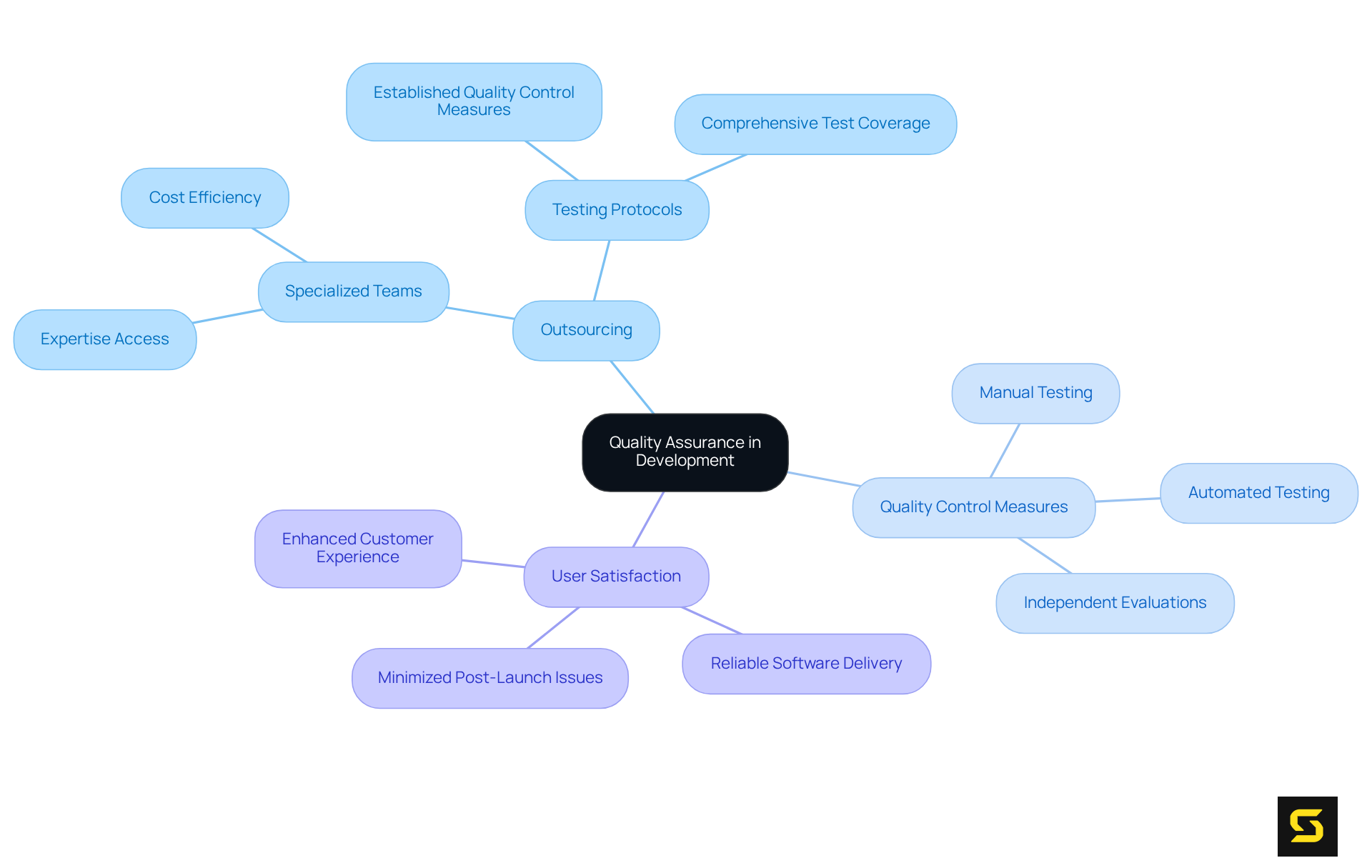
Flexibility: Adapt Project Management to Changing Needs
Outsourcing empowers to enhance their strategies in response to evolving market demands. By utilizing , outsourced teams can swiftly modify timelines and production processes based on real-time market feedback. This agility not only fosters a responsive creation atmosphere but also ensures that projects remain aligned with business goals.
Effective stakeholder communication is paramount in this context; it cultivates trust and collaboration, enabling teams to pivot quickly when necessary. Companies that implement agile practices in their development frequently report a , with data indicating that agile methodologies can lead to a 30% improvement in delivery times.
Furthermore, 59% of companies choose to software outsource to , making this a strategic choice for SaaS owners. As project management experts emphasize, the ; a proficient can anticipate challenges and modify strategies accordingly, ultimately leading to improved results and enhanced overall efficiency.
Additionally, delegating tasks allows for scalability to meet project requirements, providing the adaptability necessary to navigate evolving market circumstances. To effectively execute these strategies, software-as-a-service owners should focus on for software outsource with their business objectives and culture, ensuring that the collaboration fosters innovation and adaptability.
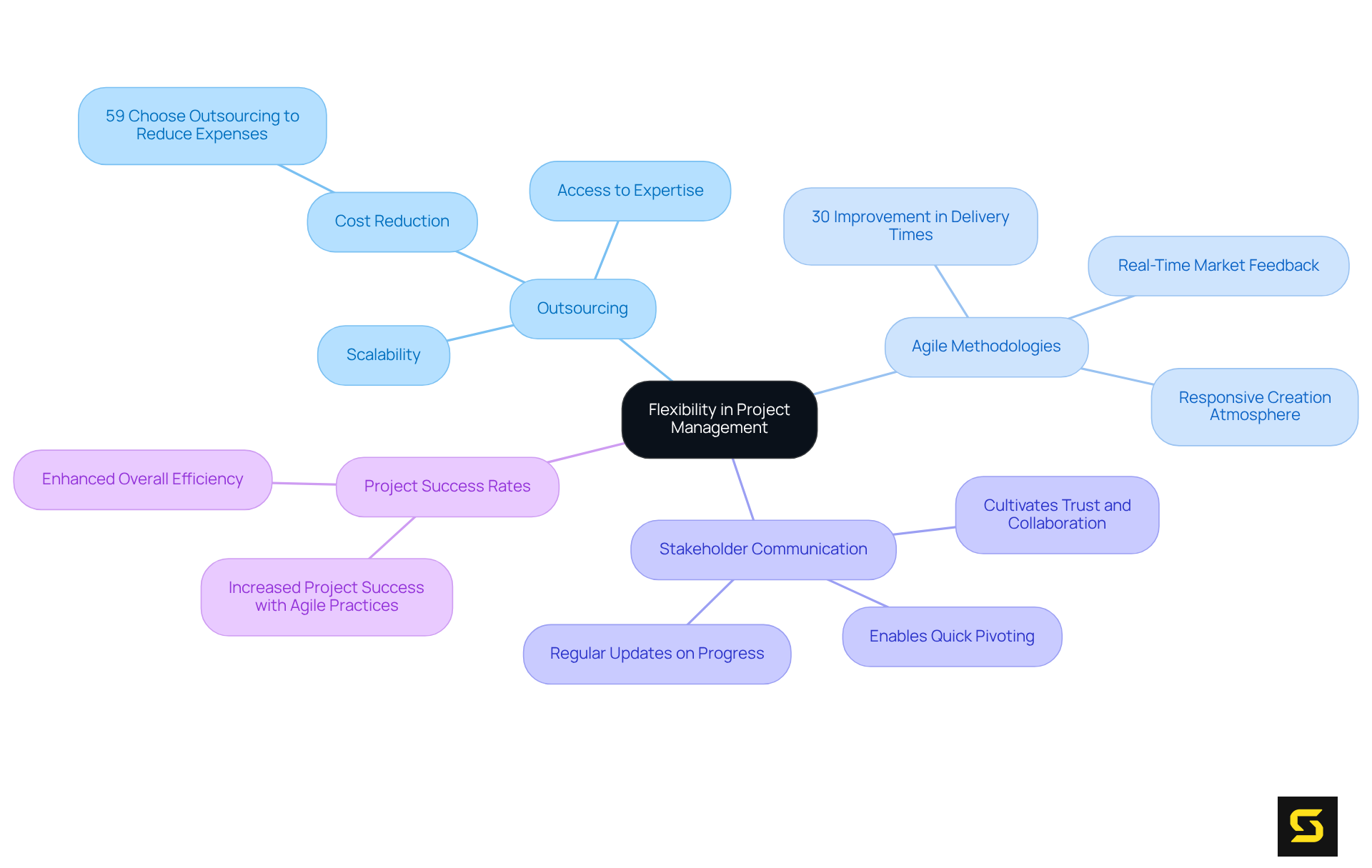
Enhanced Innovation: Foster Creative Solutions Through Outsourcing
Outsourcing serves as a powerful catalyst for innovation, seamlessly integrating diverse perspectives and ideas into the development process. By utilizing to collaborate with external teams, software owners gain access to a wealth of and can implement features that may not have been conceived internally. This infusion of fresh concepts frequently results in from software outsource providers that distinguish themselves in the competitive landscape, ultimately boosting .
Notably, research reveals that , which translates to enhanced productivity and collaboration. For example, organizations that prioritize diversity within their development teams have consistently reported —essential elements for maintaining a in the tech industry. By harnessing the insights and experiences of varied team members, can develop more robust and appealing products that resonate with a wider audience.
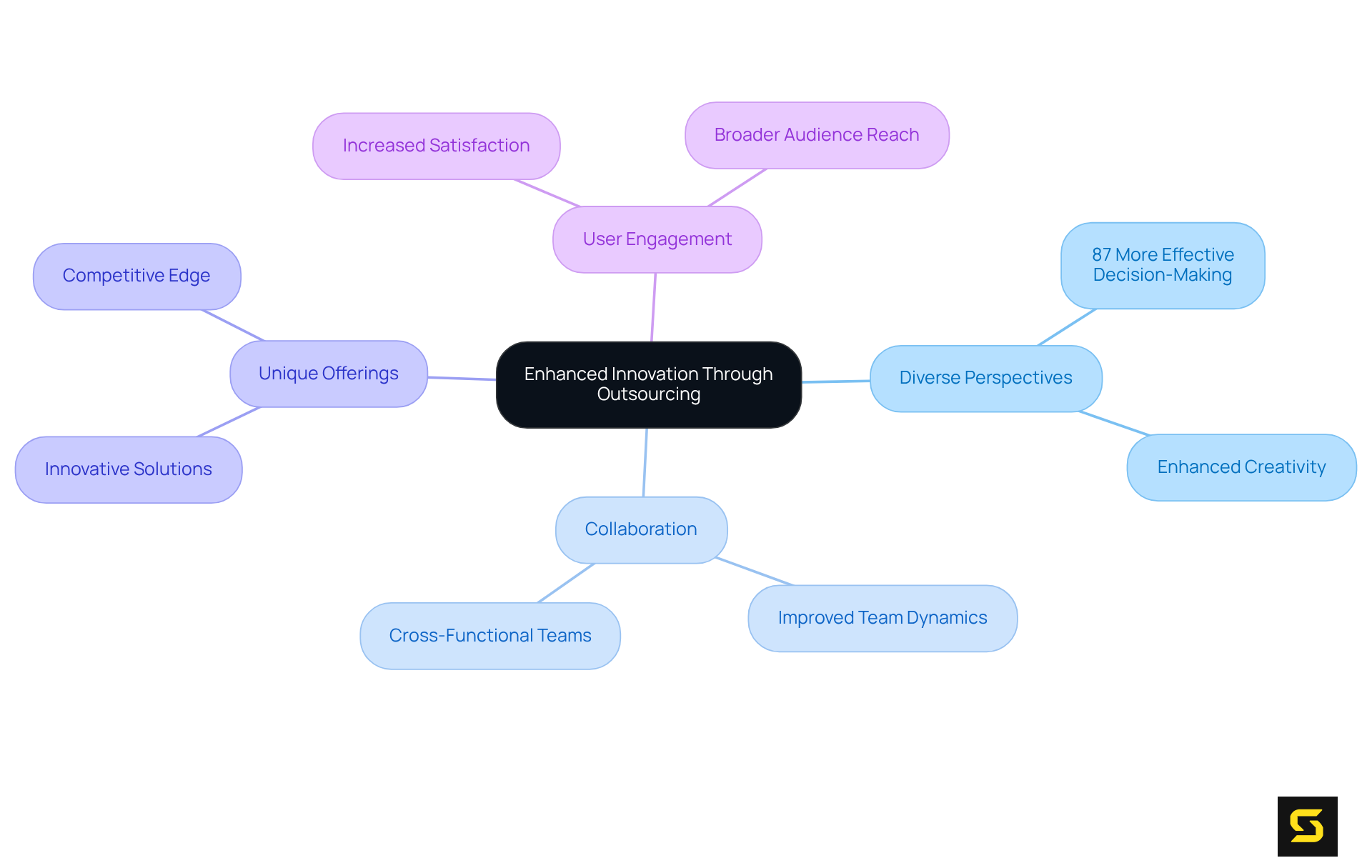
Conclusion
Outsourcing software development presents a transformative opportunity for SaaS product owners, enabling them to enhance operational efficiency, access specialized skills, and drive innovation. By leveraging external expertise, businesses can focus on their core activities while benefiting from cost savings, faster time to market, and the scalability necessary to adapt to changing project demands. This strategic approach not only streamlines development processes but also fosters a culture of innovation that is essential for success in a competitive landscape.
The article highlights several key advantages of software outsourcing, including:
- Access to a global talent pool
- Reduced operational expenses
- Improved quality assurance
Organizations can accelerate product launches and enhance user experiences through tailored solutions designed to meet specific business objectives. Furthermore, the ability to adapt project management strategies in real time is crucial for maintaining alignment with market needs and ensuring project success.
In conclusion, embracing software outsourcing is not merely a tactical decision; it is a strategic necessity for SaaS companies aiming to thrive in an ever-evolving digital environment. By prioritizing collaboration with skilled external teams, businesses can unlock new levels of efficiency, innovation, and growth. As the tech landscape continues to evolve, the importance of leveraging outsourcing to stay competitive cannot be overstated—now is the time for SaaS product owners to explore these opportunities and position their organizations for future success.
Frequently Asked Questions
What is SDA and what services does it provide?
SDA delivers tailored software outsource solutions specifically designed for software application owners, emphasizing user-centric design and seamless technology integration to enhance business offerings and user experiences.
How does tailored software development impact business growth?
Companies implementing tailored software solutions can achieve revenue growth that is up to 32 percentage points higher than their peers, highlighting the importance of effective design in business success.
What is the significance of understanding client needs in software development?
SDA's commitment to thoroughly understanding client needs ensures that the software solutions provided are innovative and strategically aligned with the client's overarching business objectives.
How does outsourcing help access specialized skills?
Outsourcing allows SaaS developers to tap into a global talent pool, providing access to specialized skills that may be scarce in local markets, which enhances development processes and fosters innovation.
What are the benefits of outsourcing in software development?
Benefits of outsourcing include saving time, reducing production costs, boosting productivity, and allowing organizations to focus on growth while external teams manage development and marketing.
What are some potential risks associated with outsourcing?
Potential risks include diminished control over quality and communication hurdles, which need to be considered when delegating tasks to external partners.
How does outsourcing contribute to cost efficiency?
Outsourcing can lead to significant cost savings, with businesses achieving up to 70% savings on software costs by utilizing global talent pools, particularly in regions with lower developer salaries.
What flexibility does outsourcing provide for companies?
Outsourcing allows companies to adjust resources based on project needs, enabling them to pay exclusively for the services they require, which is vital in a fast-paced market.
How can outsourcing improve financial management for SaaS firms?
By adopting software outsourcing strategies, SaaS firms can optimize operational expenditures, improve efficiency, and maintain competitiveness while focusing on core business functions.





